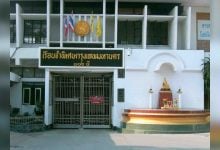Amnesty angst: Deputy PM dishes on MFP’s controversial bill, lese majeste sparks political fireworks

Deputy Prime Minister Phumtham Wechayachai reported that the proposed amnesty bill by the Move Forward Party (MFP), the main opposition, sparked controversy among various political parties due to its provision for lese majeste offences.
Phumtham, also the Commerce Minister and a senior member of the ruling Pheu Thai Party, indicated that while many parties agree with the amnesty bill’s objectives, they have reservations about particular aspects. The primary concern centres around the proposed amnesty for individuals charged or convicted of lese majeste.
The deputy prime minister further explained that the MFP’s amnesty proposal has split public opinion. He added that if outstanding issues can be resolved without triggering further conflict, the Pheu Thai Party is ready to offer its backing.
Public Health Minister Cholnan Srikaew revealed that Pheu Thai’s executive board and legal team would contemplate whether the party or the government should introduce its amnesty bill.
In response to media speculation that the Pheu Thai secretary-general would propose the party’s version, Cholnan, who previously led the Pheu Thai Party, clarified that the party had not yet deliberated on the issue. He also acknowledged that for the proposed amnesty to be universally accepted, certain compromises might be necessary.
The Chartthaipattana Party’s leader, Varawut Silpa-archa, voiced his party’s opposition to granting amnesty to individuals charged or convicted of lese majeste or of severe offences that have harmed the nation.
Amnesty bill specifics
Varawut, who also serves as the Social Development and Human Security Minister, admitted he had not yet reviewed the specifics of the MFP’s amnesty bill. He also noted that corruption cases from the past two decades were unrelated to political reconciliation.
The Director of the Chartthaipattana Party, Nikorn Chamnong, agreed that the government should propose its amnesty bill but stressed that any proposal must exclude lese majeste and serious crimes.
MFP MP Parit Wacharasindhu welcomed the submission of an alternative amnesty proposal, suggesting it would allow for a more comprehensive debate in the House. When questioned about the party’s campaign to gather input, he expressed that the MFP seeks to involve all relevant parties, especially the government, to secure the necessary votes from government MPs to pass the bill into law.
The MFP tabled the proposed bill to the House Speaker on October 5. Groups that could potentially benefit from the amnesty proposal include the People’s Alliance for Democracy, the United Front for Democracy against Dictatorship, and the People’s Democratic Reform Committee, among others.
Latest Thailand News
Follow The Thaiger on Google News:


























